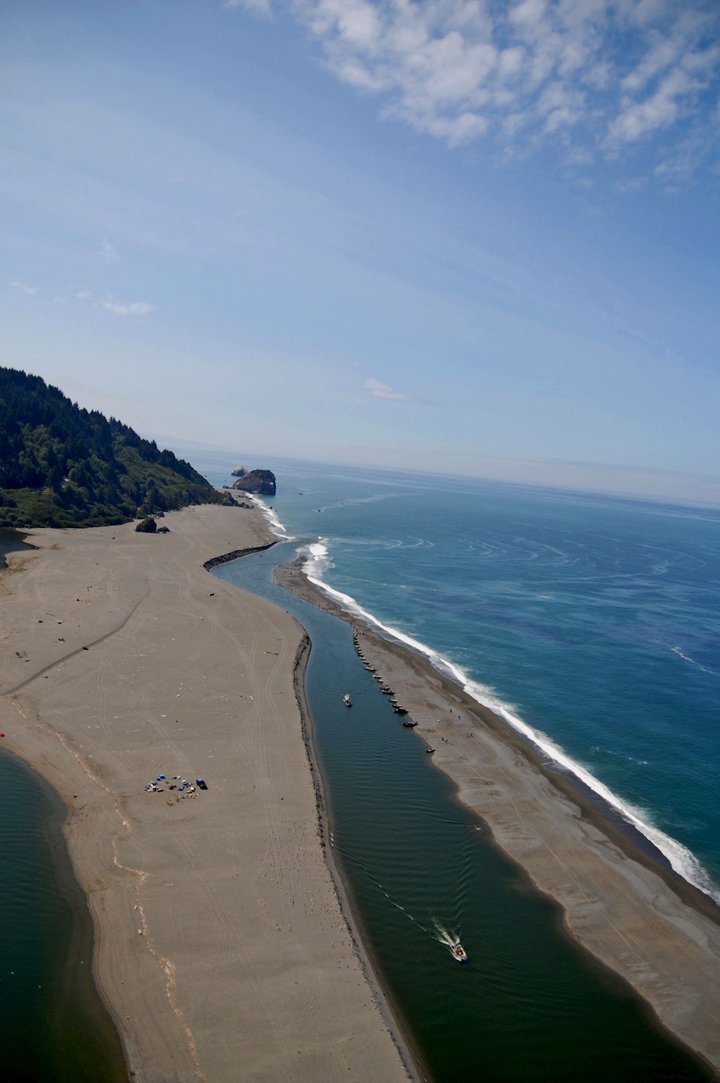WRO Staff / Thursday, April 15, 2021 @ 5:26 p.m.
Citing Drought and Mismanagement, Yurok Tribe Sounds Alarm Over Imperiled Klamath River Salmon

The mouth of the Klamath. | Photo via Yurok Tribe.
Press release from the Yurok Tribe:
The Yurok Tribe is gravely concerned about the rapidly declining salmon stocks in the Klamath Basin, where communities from the headwaters to the coast are suffering due to past water management decisions and drought.
Yesterday, the US Bureau of Reclamation released a temporary operations plan for the basin in an attempt to minimize the ecological and economic damage caused by a combination of last year’s water mismanagement and the current drought. The plan provides bare-minimum flows for imperiled Klamath salmon and sucker fish populations.
“It is unfortunate that a severe drought and climate change, coupled with risky decisions made in 2020, have left us all in this impossible bind this year,” said Frankie Myers, the Yurok Tribe’s Vice Chairman. “Based on the current conditions, the Yurok Tribe is acutely concerned about the health of the entire river from the headwaters to the sea, because it is the beating heart of all the Tribes in the basin. The Klamath salmon are now on a course toward extinction in the near term.”
In a typical April, Upper Klamath Lake rises with the spring snowmelt, but water levels are currently dropping. Equally worrisome, the prevalence of Ceratonova shasta, a deadly juvenile salmon disease, is climbing at a rapid rate and it is nearly inevitable that there will be a repeat of 2014 and 2015 when approximately 90 percent of sampled juvenile fish were infected by the deadly pathogen, and most died. In the next few months, many juvenile salmon are expected to die from the disease if additional flows are not released to flush the pathogen out of the river. During the past five years, the Klamath has experienced some of worst salmon runs on record. To protect these invaluable fish stocks, the Yurok Tribe will be cancelling its commercial fishery for the fifth time this year.
“Following five years of record-low fish runs, juvenile salmon kills and commercial salmon fishing closures, the Yurok people have paid a heavy price for the past mismanagement of the river. While we are sympathetic to our upstream neighbors, many Yurok families are also unable to pay basic bills due the fishing closures. We don’t have enough salmon for our ceremonies or to feed our elders as we have since time immemorial.” said Yurok Attorney and Ridges to Rivers Conservation Fund Principal Amy Cordalis. “We are concerned that conditions on the river are so dire that even if Reclamation’s plan is followed and minimum flows are provided, we are going to face a catastrophic loss of this year class of fish and the ecological collapse of the Klamath River. We have a duty as Yurok people to prevent that from ever happening.”
BOR’s plan provides $15 million in emergency assistance funds for irrigators in the upper basin and $3 million for Tribes. It also contains a real-time management component, but Tribes were not included in that process. Yesterday, the USDA committed another $10 million for farmers.
“Reclamation’s plan does not provide for adequate tribal consultation in the real-time management aspect of the 2021 water year. The Yurok Tribe is suffering significant economic damage on top of the extreme cultural and social impacts of failing fish runs,” Vice Chairman Myers said. “While we have never and will never put a dollar value on our fishery, there is a clear disparity in the federal relief to Tribes.”
There is an urgent need to resolve the ecological and economic threats to the communities in the Klamath Basin. The Yurok Tribe is calling for the creation of a long-term, stakeholder-driven plan that contemplates the impact of climate change and resolves the complex water challenges.
“All of this points to the need to find equitable and durable solutions that result in sustainable communities from the top to the bottom of the Klamath Basin,” concluded Vice Chairman Myers.
###
The Yurok Tribe is the largest Tribe in California with more than 6,300 members. The Tribe’s ancestral territory comprises 7.5 percent of the California coastline, spanning from the Little River to the south and Damnation Creek to the north. The eastern boundary is the Klamath River’s confluence with the Trinity River. The Tribe is a leader in natural resource management, fisheries restoration and cultural protection.
CLICK TO MANAGE